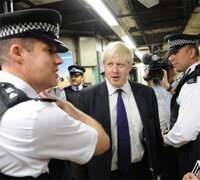We don’t do class struggle well, do we?
Britain – or England, to be more exact – was famously the home of the first great revolution of modern times, in the shape of the Civil War of 1642-1651.
I’m sure the Decent Left of the day found clear grounds on which to oppose it, especially considering the obvious parallels between Oliver Cromwell and Saddam Hussein, both brutal dictators at the head of one party theocracies. Perhaps they called on the American colonies to mount humanitarian intervention.
But to tell you the truth, I’ve always harboured a certain admiration for the Roundheads. I probably shouldn’t admit this publicly, but from time to time I have even toyed with the idea of joining the Sealed Knot.
For those that haven’t heard of these people, this is a group of enthusiasts who like nothing better than spending their weekends dressing up in seventeenth century costumes, re-enacting the major battles of the conflict, and then having a beer afterwards.
I’m sufficiently sad to think that this sounds like fun, especially when you bear in mind that the good guys are pre-ordained to win.
Trouble is, all of this stuff happened 350 years ago. How has the class struggle fared in Britain since that time? Not brilliantly well, it has to said.
This thought struck me last night as I was reading a book about the revolutions of 1848, the mighty continent-wide wave of insurrections that were such a formative experience for the young Marx and Engels.
These uprisings took in almost every nation in Europe – even ultra-irenic Switzerland – and spread as far as Brazil. And in England? Well, the Chartists limited themselves to raising a petition in favour of a few reforms. A huge proportion of the signatures were false. Sound familiar?
Then they held a demonstration which marched around London for a few hours, after which they buggered off home peacefully. Ever wondered where John, Lindsey, and the Stop the War Coalition guys and gals find the precedents for their masterful grasp of tactics? Now you know.
Here’s another sorry parallel with today. The organisers insisted the demo was 300,000 strong. The government said only 15,000 were in attendance, while the Observer called the turnout at 50,000. Plus ça change, as they say.
Moving on a little, let us consider the wake of the Russian Revolution in 1917. Loads of places witnessed the birth of huge working class-based communist parties. All we got was a poxy little Third International affiliate that struggled to build itself beyond the five figure mark.
In these decades, some countries even created mass anarchist trade union federations. Compared to the unbroken string of mediocrities that have headed the dear old TUC – from Walter Citrine to Brendan Barber – how cool is that?
Moving swiftly on, a few months back we were all treated to a relentless hippy nostalgia fest over 1968. But while the French students were building barricades and hurling cobblestones at the CRS, and their Czech counterparts bravely flung molotovs at Warsaw Pact tanks, sleepy London Town was just no place for a streetfighting man.
As far as I can make out, there was one sizeable demo outside the US embassy that featured a bit of a ruckus with the Old Bill, and that was that. The protestors spent the rest of the summer making love not war under the influence of mindbending hallucinogens while the Beatles and Hendrix played on the Dansette.
Come to think about it, the British instinct towards class compromise runs pretty deep. Take the Peasants’ Revolt of 1381, for instance. Sounds pretty militant, doesn’t it?
Until you realise that the saps were almost immediately bought off by meaningless promises by the King, who quickly reneged on them, rounded up the ringleaders and bumped them off. Apparently Jack Straw found all this sufficiently inspirational to name himself for one of the blokes who got beheaded.
The one saving grace here is that a breakaway faction – possibly the prototype for Red Action, if that lot are still going – did manage to storm the Tower of London and summarily slay all the rich bastards present.
The only conclusion that can be drawn from this sorry tale is that Britain doesn’t really do sustained class struggle. Perhaps the national stereotype is true; we really are just too polite sometimes.
-------------------------
| Tweet |
Dave Osler is a regular contributor. He is a British journalist and author, ex-punk and ex-Trot. Also at: Dave's Part
· Other posts by Dave Osler
Filed under
Blog ,Equality ,Humour ,Our democracy
12 responses in total ||
> I’m sufficiently sad to think that this sounds like fun, especially when you bear in mind that the good guys are pre-ordained to win.
good guys? Tell that to the Irish!
I’m not the plank – I promise – but I used to work with a bloke who was in the Sealed Knot. They apparently only recreate the battles that the Roundheads lost. They like the Royalists. The Civil War Recreation Society do the Roundhead victories. The two groups don’t like each other.
As far as I know, the whole situation’s like West Side Story but with more real ale and less attention to personal hygiene.
In war nobody is innocent, so if you can’t prevent it you won’t be able to claim you’re *good* even if you’re on the side of the winners.
Oliver Cromwell and Saddam Hussein, both brutal dictators at the head of one party theocracies.
One loses all credibility when one talks utter rubbish.
Saddam was a Baathist, not a theocrat, nor did he preside over a theocracy.
Your supreme ignorance renders the rest of your article irrelevant.
And the last thing the Cavaliers would have wished for would have been intervention from the American colonies; there was plenty as it was, all of it on the parliamentary side. People like Henry Vane, the governor of Massachusetts who came back to do the revolution…
(The original Sealed Knot was a post-1650 royalist conspiracy, so you can probably guess the intention here.)
Sorry, Dave, but your handle on 17th century history isn’t as good as it might be. The left of the day were the Levellers and Diggers – you might try googling “Putney debates” for a start – and Cromwell was their sworn foe: he thought that universal suffrage would lead to the destruction of property rights, so he probably wasn’t much of a political thinker, either.
The period saw not one but two military coups d’état (or three if you count William of Orange’s invasion in 1688, it’s hard to see what else it was) – a significant and underestimated disjuncture between British and American history.
Nor do I see why you are so starry-eyed about the sundry continental revolutions. Most were extremely short-lived and were succeeded by repressive régimes such as that of Napoleon III in France. The Russian case needs no comment, except perhaps to recall that the Bolsheviks had b*gger-all support outside of Moscow and St Petersburg, as the elections to the Constituent Assembly proved.
Arguably, the best place to be a member of the working class in the 19th century was Germany, and that was down to Bismarck’s “tory paternalism” and had nothing to do with revolutionary activities by students or anyone else.
What Mike said. The idea that the aristocrats, gentry and property owners that led the Parliament side were ‘the good guys’ is a bit befuddling. On a pure ‘most liberal’ analysis, the King was for freedom of conscience to a much greater degree than any on Dave’s chosen side.
And, y’know, shutting down all forms of popular entertainment and banning Christmas as unChristian aren’t the actions of any side I particularly like the sound of…
Yeah – that Russian revolution worked out really well, didn’t it?
There is one obvious reason why it’s so difficult to organise a revolution in England………
….. no one wants to fight in the pissing rain.
MattGB you are talking rubbish- actually its much more complicated than that. There were plenty of people who argued for extending toleration on the Parliamentarian side- Cromwell berated the Scots that they might think whether in the Bowels of Christ they might not be mistaken! In both the constitutions of the 1640s and 1650s- the 2nd Agreement of the People (which as Barbara Taft shows came from the Army) and the Instrument of Government (which Cromwell brought in) there was a commitment to toleration to anyone who was Protestant and accepted the state. That was far more liberty of conscience than Charles I was promising (he wanted an erastian Anglican Church in which the person of the King was united with the person of Christ in the church). You get real radicals on the Parliamentary side- like William Walwyn- arguing for complete toleration.
Radicalism on the Parliamentary side is far far too big and foreign a subject to deal with right now- but it did exist and though it isnt’ what we would think of today as radical (the Diggers fled the town and went to set up a commune in Surrey to prepare for the coming of Christ) it did have elements which we might recognise and admire.
Actually Steve, I’m not talking rubbish, although TBH I may have been conflating my monarchs, I know that JamesII was very very pro tolerance and freedom of conscience and got them mixed up. But, y’know, what’s a bit of hyperbole?
Compared to an inability to spell the name of the person you’re responding to online anyway… ![]()
Mat, you’re right, it was James II. And of course it was a cynical ploy to try to build support for Catholic toleration. James II is a somewhat tragic figure who seems to have had a nervous breakdown in 1688 (well, throwing the Great Seal into the Thames in the belief that it would make the country ungovernable is magical thinkng even by contemporary standards – you can’t imagine Louis XIV of France or William of Orange doing it).
Reactions: Twitter, blogs
Sorry, the comment form is closed at this time.
You can read articles through the front page, via Twitter or RSS feed.
» What if Superdrug lived up to its name?
» Why we want to ‘recall’ Aaron Porter as NUS President
» Breakthrough in drugs debate as MPs call for full decriminalisation
» Report shows how the promise on NHS spending has been broken
» Why climate talks in Cancun failed miserably
» Why cuts to local councils will be much worse than Tories suggest
» Left unity and the bid to oust Aaron Porter
» The true horror of NHS privatisation is slowly coming out
» Why these protests are more dangerous than politicians realise
» How the police and then the BBC tried to humiliate Jody McIntyre
» Why local and national referendums are a really bad idea
|
14 Comments 42 Comments 39 Comments 33 Comments 19 Comments 33 Comments 34 Comments 71 Comments 146 Comments 200 Comments |
LATEST COMMENTS » James posted on IFS: Child Poverty to rise due to Coalition plans » Ira posted on Ten myths about housing benefit reforms in London » rob chewit posted on More Vodafone and Topshop protests coming » rob chewit posted on How the police and then the BBC tried to humiliate Jody McIntyre » rob chewit posted on How the police and then the BBC tried to humiliate Jody McIntyre » Jenna Appleseed posted on How the police and then the BBC tried to humiliate Jody McIntyre » SSP Campsie posted on Why we want to ‘recall’ Aaron Porter as NUS President » Sunny Hundal posted on Left unity and the bid to oust Aaron Porter » Sunny Hundal posted on Why we want to ‘recall’ Aaron Porter as NUS President » Sunny Hundal posted on Why we want to ‘recall’ Aaron Porter as NUS President » Hamish posted on What if Superdrug lived up to its name? » Leon posted on Why we want to ‘recall’ Aaron Porter as NUS President » Vladimir posted on What if Superdrug lived up to its name? » Just Visiting posted on What if Superdrug lived up to its name? » Staffordshire UNISON posted on IFS: Child Poverty to rise due to Coalition plans |















